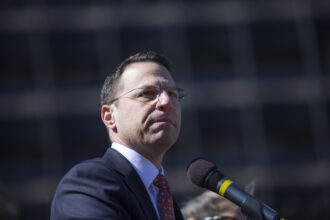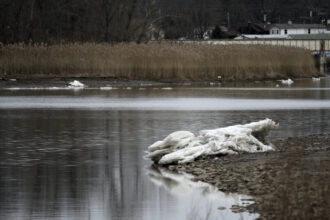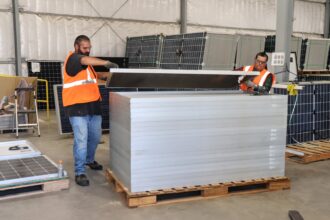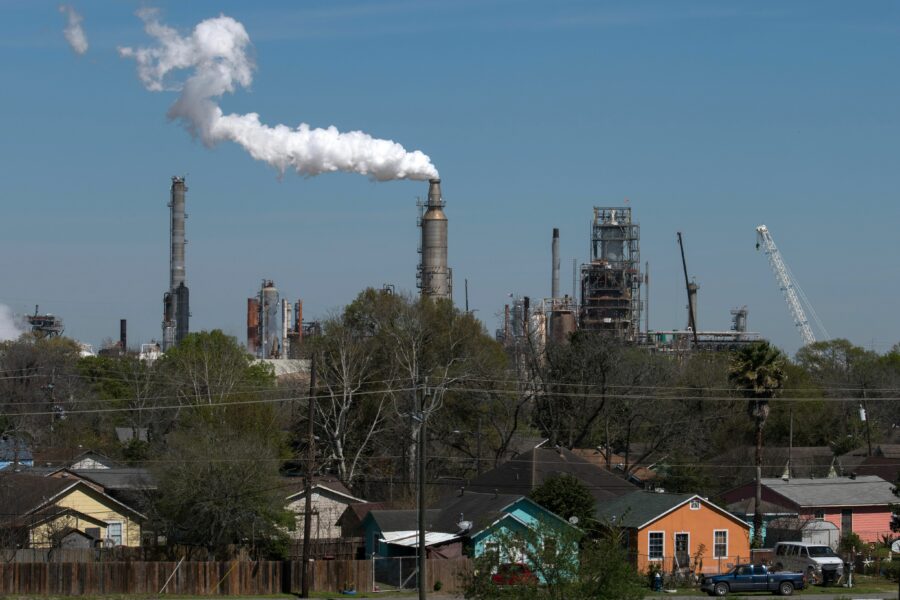HARRISBURG, Pa.—Barbara Brandom fought back tears as she contemplated the destruction of nature and a lost environment she fears her grandchildren will never experience as a result of climate change.
“If we continue to consume fossil fuels as we did in the past, by 2050, the air temperature will have increased another five degrees,” she told a daylong rally of climate protesters at the Pennsylvania Capitol on Monday. “I weep when I understand that the children who are alive now will be lucky if they live half as long as I already have.”
Brandom, 73, a retired pediatric anesthesiologist, was one of about 45 speakers at the Pennsylvania Climate Convergence, a meeting of activists that urged the administration of Gov. Josh Shapiro, as well as state lawmakers, to step up efforts to regulate and legislate against greenhouse gas emissions.
In Pennsylvania, cutting emissions would be heavily dependent on limiting the output of the natural gas industry, which produces the second-largest amount among U.S. states, after Texas.
“We need aggressive action on climate, which means in Pennsylvania not just reducing our consumption but reducing our production,” said Karen Feridun, co-founder of the PA Better Path Coalition, an activist group that opposes hydraulic fracturing, or fracking, for natural gas, an issue that many speakers accused of worsening climate change.
“We need to give people a chance to say, ‘This is what’s concerning me for future generations of my family.’ Even if they have never spent a day in the anti-fracking movement, they are worried, and they need to be heard, and they haven’t been,” she said.
Speakers included a 10-year-old girl; several representatives of 412 Justice, a Pittsburgh group representing environmental justice communities; an anti-fracking activist from the village of Dimock in Susquehanna County, and the former head of the Environmental Health Project, a nonprofit that monitors the health effects of fracking in southwest Pennsylvania.
Feridun spoke before an opening press conference in front of 10 ice sculptures of child figures that were steadily melting in unseasonably warm October sunshine outside the Pennsylvania Capitol building in Harrisburg.
She accused Shapiro, a Democrat, of not taking climate change seriously, and of promoting the interests of the natural gas industry including a proposed hydrogen hub in western Pennsylvania and neighboring states. Shapiro has strongly backed building the plants which would produce and distribute hydrogen for making electric power and other industries, but would burn methane, a potent greenhouse gas, in the process.
And she attacked last week’s report by a working group Shapiro appointed to weigh membership in the 12-state Regional Greenhouse Gas Initiative (RGGI), a cap-and-invest cooperative under which the states cap emissions from their power sectors and require power generators to buy “allowances” at periodic auctions for each ton of carbon they will emit above the cap. The group, which included environmentalists and industry representatives, agreed that efforts were needed to reduce greenhouse gas emissions, but it stopped short of endorsing RGGI membership. Feridun called it “nibbling around the edges” of curbing power-sector carbon emissions.
The Shapiro administration has promised to make the gas industry operate more safely, following a scathing grand jury report on the industry in 2021 when the governor was attorney general. The administration has also imposed millions of dollars in fines on Monsanto and Shell for pollution; updated an environmental justice policy, and is working to plug more than 200 abandoned oil and gas wells that produce some eight percent of the state’s methane emissions.
Shapiro’s press secretary, Manuel Bonder, did not respond to activists’ claims that the administration is denying climate change and promoting fossil-fuel interests. But he said it is working to protect the environment while creating jobs in the oil and gas industry.
“The Shapiro Administration has prioritized protecting Pennsylvanians’ constitutional right to clean air and pure water—drawing down federal funding and cutting red tape to build up clean energy infrastructure in the Commonwealth, holding polluters accountable, and delivering millions of dollars for affected communities,” Bonder said in a statement. “Governor Shapiro is focused on bringing people together to protect and create energy jobs, take real action to address climate change, protect consumers and ensure Pennsylvania has reliable, affordable, and clean power for the long term.”
In the state legislature, lawmakers are not expected to impose legal curbs on the gas industry, given a Republican majority in the Senate, and what activists say is support for the gas industry among many Democrats.
State Sen. Katie Muth, a Democrat representing parts of the Philadelphia suburbs, said in an interview that she had introduced three bills that would close federal and state loopholes in laws governing the disposal of oil and gas waste. But she acknowledged they have little chance of becoming law given her party’s minority status in the Senate, and she said she was one of only a handful of lawmakers from either party who attended the climate protest.
“Considering we’re in the minority in the Senate, and because of an unfortunate bipartisan love affair with gas and oil, I think it’s unlikely they will become law,” she said of the bills. But she predicted that increased public awareness of the risks of water and air pollution from the oil and gas industry, as exemplified by Monday’s climate convergence, “can change the game.”
Still, a bill in the House introduced by Reps. Charity Grimm Krupa and Mark Gillen, both Republicans, would ban injection wells for oil and gas wastewater, also known as produced water, and prevent the Department of Environmental Protection from issuing permits for those wells.
The Environmental Protection Agency issued a permit for a second injection well in Plum Borough outside Pittsburgh last month, rejecting claims by residents that the well could pollute wells or aquifers. The permit still must be approved by the DEP and local governments. It would be the 15th injection well in the state.
Speakers at the climate event on Monday included David Zeballos of the Center for Climate Integrity, a nonprofit that helps states and communities hold oil and gas companies accountable for the costs of climate change. Zeballos said fossil-fuel companies knew for decades that their products damaged the climate but responded with a campaign of “doubt, denial and disinformation” in order to delay climate action.
Keep Environmental Journalism Alive
ICN provides award-winning climate coverage free of charge and advertising. We rely on donations from readers like you to keep going.
Donate Now“Fossil fuel companies have made trillions of dollars from the products that cause climate change, and they continue to delay and block climate action to this day,” Zeballos said. He said taxpayers are now paying high costs for recovery from, and adapting to, climate-change effects, and those costs should instead be borne by companies that made the products.
But the Pennsylvania branch of the American Petroleum Institute, the oil industry’s main trade group, said it had played its part in cutting emissions.
“The record of the past two decades demonstrates that the industry is achieving its goal of providing affordable, reliable American energy to U.S. consumers while substantially reducing emissions and our environmental footprint,” Executive Director Stephanie Catarino Wissman said in a statement. “Any suggestion to the contrary is false.”
Barbara Brandom, a resident of Somerset County, accused the fossil fuel industry of worsening asthma of people living near gas wells, as shown by recent epidemiological studies. She argued that burning methane to create hydrogen from water, as proposed in the hydrogen hubs, would only emit more greenhouse gases. Instead, Pennsylvania and the wider world should electrify with wind, solar, hydroelectric and geothermal energy, she said.
“Now I understand that the fossil fuel industry has destroyed my hopes for my family and given us a life-threatening climate crisis,” she said.











